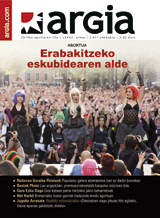Hurkoa gogoan aztarrika
Euskaltzaleok eta euskalgintzan gabiltzanok izan ohi dugun buruhausteetako bat euskararekiko motibazioa izan ohi da. Alegia, erdalduna eta euskalduna motibatu nahi izaten ditugu, batak euskara ikas dezan eta bestea euskaraz ari dadin. Hori, dena den, nolabaiteko paradoxa ere izan liteke. Beste batzuen motibazioa elikatu behar dugu. Zergatik, ordea? Zergatik saiatu hurkoak euskara ikasi edo erabiltzeko interesa izan dezan? Ez badu “naturalki” nahi –hizkuntza hautuak sarritan oso naturalak ez diren arren–, ez badu pertsona horrek motibaziorik berez, zer dela-eta elikatu behar diot nik beraren barruko motibazioa, sentimendu bat azken batean? Zergatik saiatu inoren gogoan sartzen, haren lurralde propioa eta intimoa baldin bada?
Ikuspegi “altruista” batetik begiratu genezake kontua, eta hizkuntzaren eta hiztun horren hobe beharrez egiten dugula esan. Euskara ikasita edo euskaraz eginda irabaziren bat izanen luke hiztunak, eta bide batez hizkuntzak, eta hori ikusarazten saiatuko gara, egun ez duen motibazio hori izan dezan.
Ikuspegi “egoista” batetik ere azter genezake. Hizkuntza errealitate indibiduala eta psikologikoa ere badela sinetsita nago, baina hori bezain argia iruditzen zait gertaera zeharo soziala ere badela. Eta neroni izaki soziala izaki, neronek ere behar dut nire inguruan euskaraz eginen duen jendea, neronek eginen badut. “Neroni” hori norbanakoa edo hizkuntza komunitatea izan liteke. Hau da, euskaraz egiteko motibatuta dagoen jendea behar dut, bestela ez dudalako izanen norekin egin. Nahikoa arrazoi bada hori, ziur asko, gaur gogorik ez duten horiengan gogoa pizten saiatzeko.
Lehendabiziko ikuspegi horretatik euskararen aldeko lanean ari litezke, esate baterako, euskararik ez dakiten euskaltzale erdaldunak. Egon bai baitaude, ez gutxi gainera, kontraesanaren tamainaz egin genezakeen balorazioa gorabehera. Eta euskaldunak ere bai, noski.
Motibazioa lantzeko beharraren ikuspegi berekoia, aldiz, normalean euskaldunarena izanen da, horrexek aterako baitio probetxua, ingurukoak motibatzen eta euskarara bultzatzen asmatuz gero behintzat.
Bata izan ala bestea izan, nolanahi ere, euskara ikasteko eta erabiltzeko motibazioa lantzeak ez dauka ez, absurdutik batere, eta are gehiago, ziur asko uste genuena baino ezinbestekoagoa da, osagai ezinbestekoa gure estrategia guztietan, motibazio eskas edo ahul antzeko batekin ez baitiogu behar bezala aurre eginen hizkuntza aniztasunaren panoramatik datorkigun oldeari.
There are no breathing spaces without proper speakers. Native speakers are the support, the oraceration, the mainstay and the foundation of the respiratory zones.
But let's start at the beginning: what are the respiratory zones? The word Arnasa is a word translated into Basque... [+]
Kaleko 71.000 elkarrizketa eta 227.900 solaskide behatu dituzte UEMAko herrietan, eta 2017koa baino ikerketa are sendoagoa burutu dute. Erabilera orokorra ez da ia aldatu: bostetik hiru aritzen dira euskaraz. Adina eta generoaren arabera badira desberdintasun batzuk.























